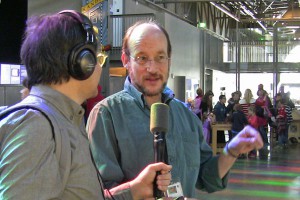
At San Francisco’s Exploratorium, a few eager experimenters stand around a screen with fingers flying. They’re texting, and with each message sent they catch a virtual fish.
There are plenty of virtual fish for everyone, but the same thing happens over and over. And over. And over.
They run out.
“It’s very common for people to want to drive the system to the limit first to find out how it works and then to cooperate,” says Exploratorium Associate Curator Hugh McDonald. “So often the first thing that happens here is people will fish as fast as they can to see what the limit is. And then, unlike in the real world, they get a chance to reset and say ‘Oh, now let’s try where we cooperate.’”
McDonald has a doctorate in social psychology. His specialty at the Exploratorium is getting people to experiment with and examine human social interactions.
Text Fish is just a tech-savvy version of the classic puzzle called the Tragedy of the Commons, and it’s one of many Science of Sharing exhibits. They focus on when we behave altruistically, when we don’t, and why.
McDonald says the point is not to manipulate people into becoming more generous.
“We shy away from having an agenda here,” he says. “We don’t want to tell people what to do. We want to give them the tools to decide for themselves how to behave.”
One of the obvious variables in these experiments is that people are more likely to behave altruistically when they have an audience. McDonald says this may be true, but it doesn’t negate the validity of the results.
“There’s a lesson there that maybe what you do is you make certain kinds of negotiations public,” he says. “You don’t allow certain kinds of negotiations, about climate change for example, to happen behind closed doors.”
McDonald says there are parallels not only with climate change, but other global problems that call for humans to share resources.
“There’s a tension between thinking about me and thinking about us, and there’s often a tradeoff there,” McDonald says. “And thinking about us often does mean that you sacrifice something. You sacrifice that immediate tangible gain that you could have in your hands right now for some larger, maybe abstract gain. Maybe a gain you don’t even see.”
One of the underlying questions with all of these experiments is the source of altruism. Have people evolved to be altruistic? Is altruism inborn, or learned?
There are plenty of studies that suggest that humans aren’t the only altruistic species. Bonobo apes share their food, for example.
Some animals cooperate and share even when they’re not genetically related.
“Even cells can do things that look an awful lot like collaborative behavior and in fact can sacrifice something of their own to collaborate for the greater good,” says McDonald. “So it’s clearly not something that’s only the product of advanced thought. It’s something evolutionarily important.”
McDonald says there’s certainly an argument to be made that altruistic tendencies are part of our nature.
“The question is what social contexts bring those out or promote your acting on them and what social contexts dampen those down and promote you acting on selfish things?” he says. “We have the capacity to be both altruistic and selfish. The question is, how do you structure a societal interaction so that you bring out the behavior that you want to bring out?”
Even if you can determine that, McDonald points out, it won’t always work. There will always be people who choose the selfish route.
Along with those people, though, McDonald has observed some who could be game-changers. Once in a while a person not only takes the unselfish route, but holds others accountable as well.
“I’ve only seen it a few times but it fills us with joy when we see it,” he says.
McDonald says on occasion—rare occasion—someone playing Text Fish will publicly call out a fellow fisherman who is using up all the resources.
“That act of, ‘I’m going to advocate for the group, publicly advocate for the group,’ that’s a great moment of social interaction,” McDonald says.
Because if no one speaks up, the same thing will happen over and over. And over. And over.





Nice description! I’d like to clarify that although I am the Principal Investigator of the National Science Foundation-funded Science of Sharing project and oversee the creation of its exhibits and activities, the Textfish exhibit was designed and built by the esteemed Bill Meyer, Director of New Media at the Exploratorium, and his team. We’ll be experimenting with a variety of new Science of Sharing exhibit ideas at the Exploratorium in 2014, and we welcome all feedback.
Thank you!
Hugh M
Thanks, Hugh. We clarified our language.